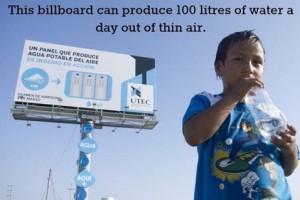The University of Engineering and Technology, in collaboration with the Mayo DraftCFB ad agency, invented a billboard that draws humidity from the air and turns it into clean drinking water. It’s a good thing too because the billboard is located in the desert mega-city of Lima where clean drinking water is a scarce commodity.
-
Recent Posts
- Crop Circles: Yesterday and Today By Rob Simone
- The Rob Simone Talk Show with guest Uri Geller
- Cool! Another Earth Discovered…NASA’s Kepler space telescope finds more Earth-like planets
- Amazing! Billboard Makes Water From The Thin Air
- Rob Simone Appears on the new Hit TV Show “Unsealed” The Conspiracy Files
- Rob Simone will appear on the TRAVEL CHANNEL's "Mysteries at the Museum" - June 12th 8pm EST
Categories



